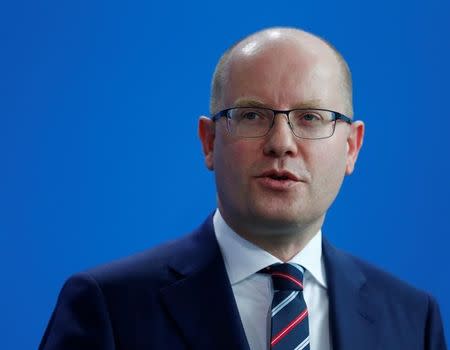Czech PM gambles by resigning to end finance minister spat

By Jan Lopatka and Robert Muller PRAGUE (Reuters) - Prime Minister Bohuslav Sobotka shocked Czechs on Tuesday by saying he and his cabinet would resign to resolve a dispute with his billionaire finance minister, a huge gamble before an election due in October. The move creates an uncertain political situation in which President Milos Zeman will need to decide the next move. It follows growing tensions over past financial dealings by Finance Minister Andrej Babis, whose centrist ANO movement leads opinion polls by a double-digit margin. "I cannot as prime minister further bear responsibility for a situation where a person whose past is unclear is in the position of finance minister," Sobotka told reporters. "Therefore I am taking the only reasonable solution, which is that the government resigns." Babis, who denies wrongdoing, said on Facebook: "I am surprised... It is a desperate step by a desperate person." The resignation opens up a variety of scenarios in the European Union and NATO member state. They include: the appointment of a new cabinet formed by the same three-party centre-left coalition; a caretaker cabinet; an early election; or the current cabinet staying in power until October despite having resigned. The government has presided over three years of economic growth and posted a rare budget surplus last year. It was poised to be the first Czech cabinet to serve a full four-year term since 2002. Czech markets were calm, with the crown unmoved against the euro after a brief blip and bonds supported by inclusion into JP Morgan's emerging markets index, which means index-tracking investors will need to buy them for their portfolios. [ BUSINESS EMPIRE Babis, who built the Agrofert chemicals and media group into the country's biggest private company, has been under fire for months due to his past business dealings. Authorities have been looking into legal loopholes Babis used to buy tax-free bonds from his firm several years ago, and into EU subsidies awarded to a company ultimately acquired by Babis for building a conference and leisure centre outside Prague. Babis transferred Agrofert to a trust fund earlier this year to comply with new conflict-of-interest legislation. He said he did not understand Sobotka's decision, saying it damaged the work of the whole cabinet. He argued that the best solution would be for the cabinet to stay in place until the October election. This is possible under the constitution, if the president does not appoint a new administration. Babis is the country's second most popular politician after Zeman. The president has had good relations with Babis and poor relations with Sobotka, making the prime minister's gamble all the more risky for him and his Social Democrats. Vladimír Bartovic, director of the EUROPEUM think tank, said Sobotka had faced unsavoury options: leaving Babis in place and looking weak, or making him look like a scapegoat. "It is like a drowning man grasping for a straw," he said. "I think voters will not understand this step and it will not help the Social Democrats." Sobotka said Babis had damaged the cabinet's image. He said firing the minister and leaving the cabinet in place - a solution that seemed likely in recent days - would only help Babis to portray himself as a martyr, and therefore the full cabinet's resignation was the way to go. Sobotka said he would seek a meeting with Zeman to agree timing for the resignation and further steps. He said the coalition could possibly be recreated without Babis as minister, or the election could be held earlier. The decision hands large power to Zeman, who can choose a prime minister of his liking. In 2013 he appointed his ally Jiri Rusnok -- now the head of the central bank -- as caretaker prime minister against the wishes of most political parties. (Additinoal reporting by Jason Hovet and Petra Vodstrcilova; Editing by Mark Trevelyan)

